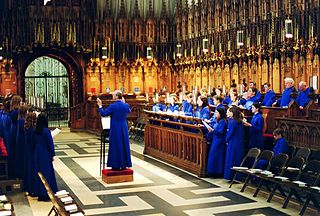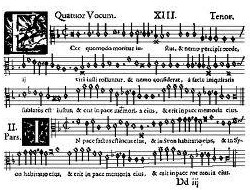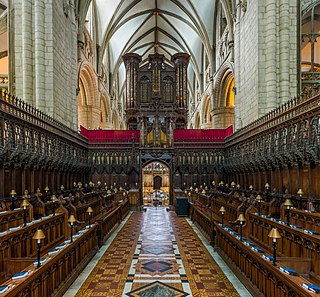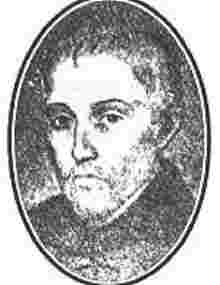
A choir is a musical ensemble of singers. Choral music, in turn, is the music written specifically for such an ensemble to perform or in other words is the music performed by the ensemble. Choirs may perform music from the classical music repertoire, which spans from the medieval era to the present, or popular music repertoire. Most choirs are led by a conductor, who leads the performances with arm, hand, and facial gestures.

Sir Charles Hubert Hastings Parry, 1st Baronet, was an English composer, teacher and historian of music. Born in Richmond Hill in Bournemouth, Parry's first major works appeared in 1880. As a composer he is best known for the choral song "Jerusalem", his 1902 setting for the coronation anthem "I was glad", the choral and orchestral ode Blest Pair of Sirens, and the hymn tune "Repton", which sets the words "Dear Lord and Father of Mankind". His orchestral works include five symphonies and a set of Symphonic Variations. He also composed the music for Ode to Newfoundland, the Newfoundland and Labrador provincial anthem.

John Milford Rutter is an English composer, conductor, editor, arranger, and record producer, mainly of choral music.

Anglican church music is music that is written for Christian worship in Anglican religious services, forming part of the liturgy. It mostly consists of pieces written to be sung by a church choir, which may sing a cappella or accompanied by an organ.

Patrick Hawes is a British composer, conductor, organist and pianist.
Herbert Whitton Sumsion was an English musician who was organist of Gloucester Cathedral from 1928 to 1967. Through his leadership role with the Three Choirs Festival, Sumsion maintained close associations with major figures in England's 20th-century musical renaissance, including Edward Elgar, Herbert Howells, Gerald Finzi, and Ralph Vaughan Williams. Although Sumsion is known primarily as a cathedral musician, his professional career spanned more than 60 years and encompassed composing, conducting, performing, accompanying, and teaching. His compositions include works for choir and organ, as well as lesser-known chamber and orchestral works.
Egil Hovland was a Norwegian composer.
Charles John Grayston Ives, also known as Bill Ives, is a British composer, singer and choral director.
A part song, part-song or partsong is a form of choral music that consists of a song to a secular or non-liturgical sacred text, written or arranged for several vocal parts. Part songs are commonly sung by an SATB choir, but sometimes for an all-male or all-female ensemble. Part songs are intended to be sung a cappella, that is without accompaniment, unless an instrumental accompaniment is particularly specified.
Robert Quinney is Director of the Choir of New College, Oxford, and was formerly Sub-Organist at Westminster Abbey and Director of Music at Peterborough Cathedral. In addition to his work at New College, he has a freelance career as soloist, ensemble player, and writer on music. From October 2009 till 2014 he was Director of Oundle for Organists, whose residential courses provide inspiring tuition for young organists.
Alexander Richard William L'Estrange is an English composer of choral music and music for television and an arranger for vocal ensembles. He is also a jazz musician, choral workshop leader, presenter of children's concerts and was a jazz examiner and trainer for ABRSM.
Christus factus est is taken from Saint Paul's Epistle to the Philippians. It is a gradual in the Catholic liturgy of the Mass. In pre-Vatican II Roman Rite practice, it was sung as the gradual at Mass on Maundy Thursday, however since the promulgation of the post-Vatican II Mass by Pope Paul VI in 1969 it has been employed instead as the gradual on Palm Sunday. Up until 1970 it was also sung daily at the conclusion of Tenebrae on the last days of Holy Week. It appeared first at Tenebrae of Maundy Thursday, but was not recited in full, ending with "...usque ad mortem". The following day at Tenebrae of Good Friday it was sung from the beginning until "...mortem autem crucis" and at Tenebrae of Holy Saturday it was sung in full. Up until the reform of the Holy Week liturgy promulgated by Pius XII in 1955 these Tenebrae services were sung in the late afternoon and evening of the previous day, and were well attended by the laity. Thus Tenebrae of Maundy Thursday was sung during the evening of Spy Wednesday; Tenebrae of Good Friday in the evening Maundy Thursday etc. For this reason Christus factus est was set by many composers of church music. From 1956 through 1969, and in the liturgical books of 1962 which are currently in use as the extraordinary form of the Roman Rite, these services have been place back in early mornings of the last three days of Holy Week, with the effect that complex musical settings of this text are rarely heard in their liturgical context.
Quatre motets pour un temps de pénitence, FP 97, are four sacred motets composed by Francis Poulenc in 1938–39. He wrote them on Latin texts for penitence, scored for four unaccompanied voices.

The righteous perishes are the words with which the 57th chapter of the Book of Isaiah start. In Christianity, Isaiah 57:1–2 is associated with the death of Christ, leading to liturgical use of the text at Tenebrae: the 24th responsory for Holy Week, "Ecce quomodo moritur justus", is based on this text. More generally, the text is associated with the death of loved ones and is used at burials. As such, and in other versions and translations, the Bible excerpt has been set to music.

Three Latin Motets, Op. 38, is a collection of three sacred motets based on Latin texts for mixed unaccompanied choir by Charles Villiers Stanford, comprising Justorum animae, Coelos ascendit hodie and Beati quorum via. The texts come from different sources, and the scoring is for four to eight parts. They were published by Boosey & Co in 1905. The works, some of Stanford's few settings of church music in Latin, have remained in the choral repertoire internationally and are performed in liturgies and concert.

In Exile is a motet by Herbert Sumsion, who was for decades organist at Gloucester Cathedral. He set in 1981 a biblical text from Psalm 137 in English, beginning "By the waters of Babylon", scored for double choir a cappella. The motet was published by Basil Ramsey.

Popule meus is a motet for Good Friday by Tomás Luis de Victoria. He set a liturgical text from the Improperia, which contains the Greek-Latin Trisagion, prescribed for use in the Catholic responsory for Good Friday. It begins "Popule meus, quid feci tibi?". The composition, scored for four voices, SATB, was published in Rome in 1585 in Officium Hebdomadae Sanctae.

Locus iste, is a sacred motet composed by Paul Mealor in 2011. The text is the Latin gradual Locus iste for the annual celebration of a church's dedication. Mealor set it for four unaccompanied voices, at times divided, for the 500th anniversary of the King's College Chapel in Aberdeen in 2009.










